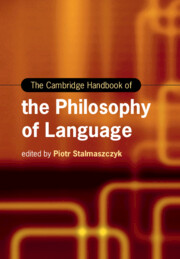Book contents
- The Cambridge Handbook of the Philosophy of Language
- Cambridge Handbooks in Language and Linguistics
- The Cambridge Handbook of the Philosophy of Language
- Copyright page
- Contents
- Figures
- Tables
- Contributors
- Preface
- 1 Philosophy of Language: Definitions, Disciplines, and Approaches
- Part I The Past, Present, and Future of Philosophy of Language
- Part II Some Foundational Issues
- Part III From Truth to Vagueness
- Part IV Issues in Semantics and Pragmatics
- Part V Philosophical Implications and Linguistic Theories
- 26 Philosophical Implications of Generative Grammar
- 27 Conceptual Semantics and Its Implications for Philosophy of Language
- 28 Relevance Theory and the Philosophy of Language
- 29 Mental Files
- 30 Contemporary Discourse Studies and Philosophy of Language
- Part VI Some Extensions
- References
- Index
27 - Conceptual Semantics and Its Implications for Philosophy of Language
from Part V - Philosophical Implications and Linguistic Theories
Published online by Cambridge University Press: 12 November 2021
- The Cambridge Handbook of the Philosophy of Language
- Cambridge Handbooks in Language and Linguistics
- The Cambridge Handbook of the Philosophy of Language
- Copyright page
- Contents
- Figures
- Tables
- Contributors
- Preface
- 1 Philosophy of Language: Definitions, Disciplines, and Approaches
- Part I The Past, Present, and Future of Philosophy of Language
- Part II Some Foundational Issues
- Part III From Truth to Vagueness
- Part IV Issues in Semantics and Pragmatics
- Part V Philosophical Implications and Linguistic Theories
- 26 Philosophical Implications of Generative Grammar
- 27 Conceptual Semantics and Its Implications for Philosophy of Language
- 28 Relevance Theory and the Philosophy of Language
- 29 Mental Files
- 30 Contemporary Discourse Studies and Philosophy of Language
- Part VI Some Extensions
- References
- Index
Summary
Conceptual Semantics is a thoroughly mentalist theory of meaning, language, and thought (Miller and Johnson-Laird, 1976; Jackendoff, 1983, 1987a, 1990, 2002, 2012; Pustejovsky, 1995; Pinker, 2007; plus closely related work broadly in the Cognitive Grammar tradition by Lakoff, 1987; Langacker, 1987; Talmy, 2000; and many others). The theory represents a fundamental break from traditional formal semantics, and it has consequences not only for philosophy of language, but also for philosophy of mind, metaphysics, and possibly even ethics. The present chapter sketches a few of the many issues treated within this theoretical worldview, in the hope of capturing the spirit of the enterprise.
Information
- Type
- Chapter
- Information
- The Cambridge Handbook of the Philosophy of Language , pp. 491 - 514Publisher: Cambridge University PressPrint publication year: 2021
